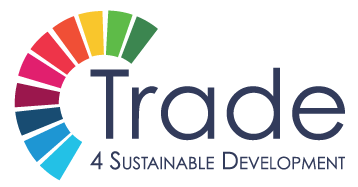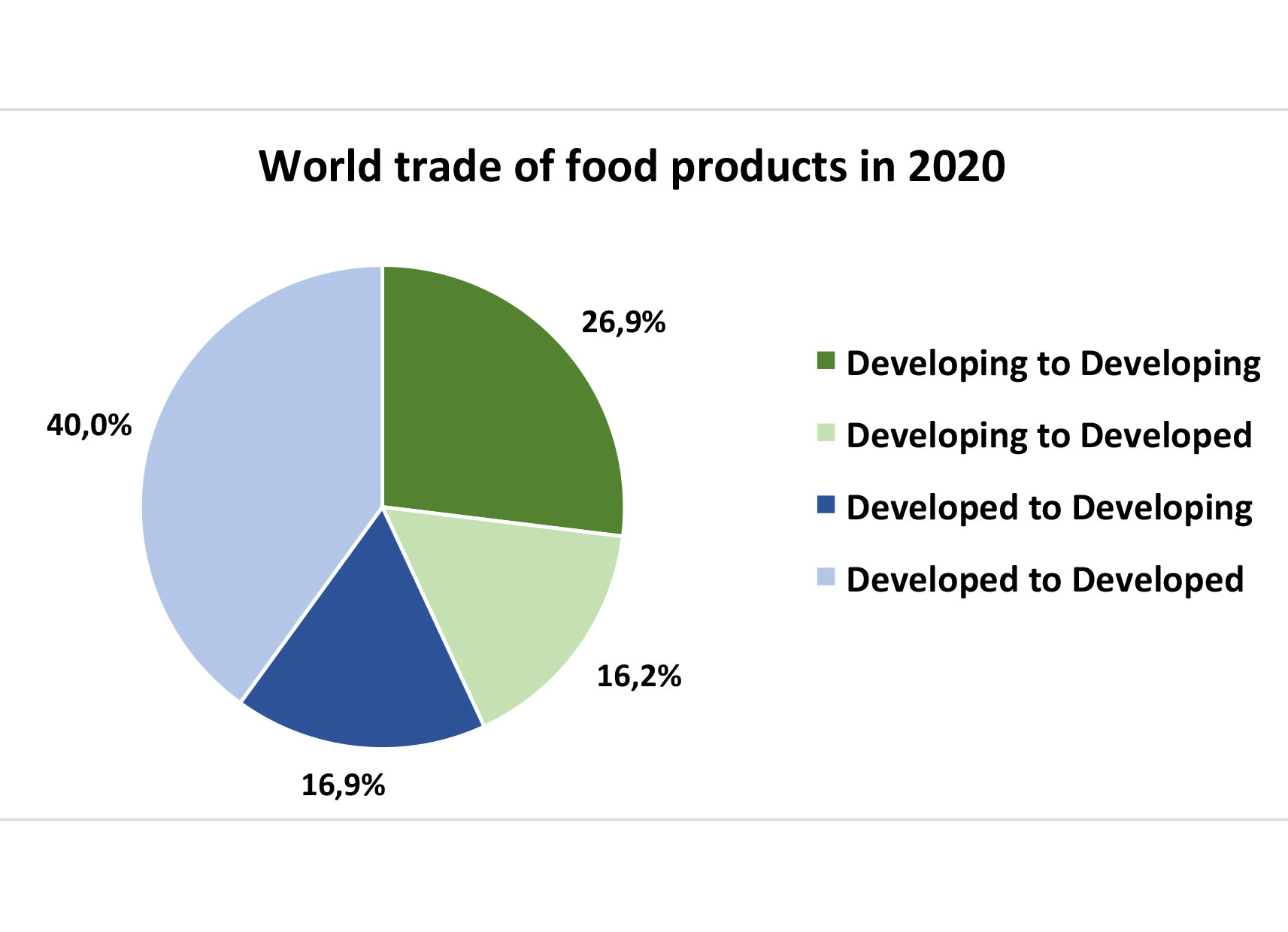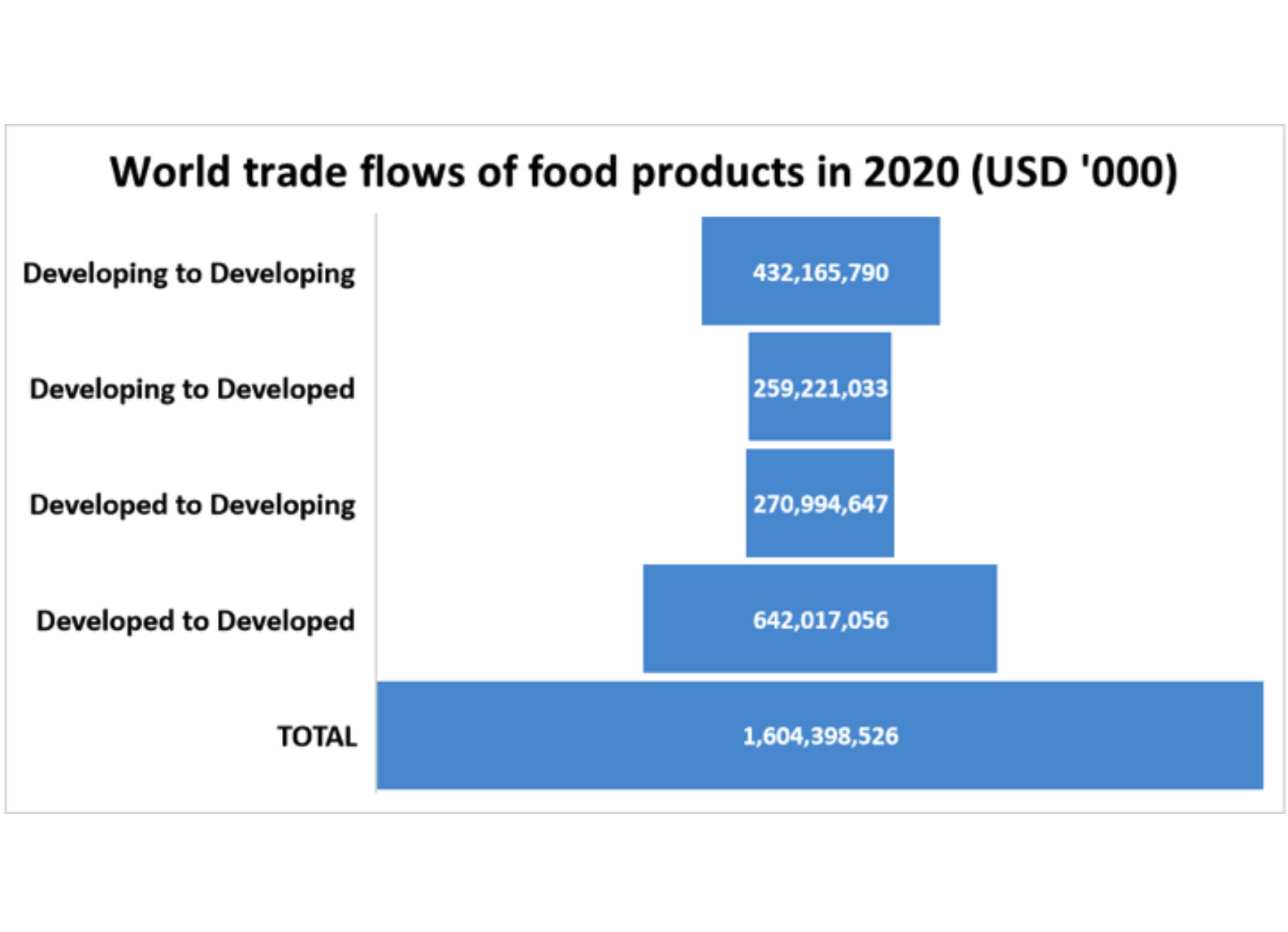Global food trade is resilient
The year 2020 marked one of the biggest recessions in global economic activity and world trade. During this period, the world economy contracted by more than 3% and global trade of products decreased by nearly USD 1.5 trillion compared to 2019. In contrast to the total trade, international trade of agri-food products increased by almost USD 28 billion. This is an indicator that global food trade is resilient, and international trade has played a crucial role in mitigating the devastating economic impact of the COVID-19 pandemic. Open global food trade makes food available and prevents food shortages in domestic food markets during a crisis. In 2020, food exports from developing countries accounted for 43% (see pie chart) of the world’s food trade, which provided very significant contributions both to incomes and welfare.
According to the world trade flows of food products in 2020 (see diagram), developing countries exported USD 259 billion worth of food products to the developed countries, but the food trade was much larger among the developing countries themselves with a total trade of USD 432 billion. By contrast, food trade among the developed countries was the biggest food trade with a total value of USD 642 billion; meanwhile, developed countries exported USD 271 billion worth of food products to the developing countries. Therefore, the value of food products exported by the developed countries to the developing countries is quite close to the value of food products exported by the developing countries to the developed countries. What are the impacts of these trade flows on sustainable development?
The 17 Sustainable Development Goals (SDGs) are an urgent call for action by all countries – developed and developing – in a global partnership. The SDGs acknowledge that ending poverty and other deprivations must be implemented at the same time with strategies that improve health and education, reduce inequality, and spur economic growth as well as tackling climate change and preserving our oceans and forests. How do we foster the positive linkages between trade and sustainable development?
Strong foreign direct investments have positive outcomes on the SDGs
We must first discover the conditions that are directly or indirectly causing the positive and negative outcomes on the SDGs. For example, strong foreign direct investments have direct linkages to SDG 8 (Decent Work and Economic Growth) and SDG 9 (Industry, Innovation and Infrastructure). These direct linkages have positive outcomes on economic growth, employment opportunities, and access to markets. For instance, in Indonesia, agro-industrial oil palm plantations are an important driver of economic development since they provide employment in rural areas and contribute to state revenues. Infrastructure developments (e.g., feeder roads) link rural areas with urban areas, relevant markets, and marketplaces for direct sales as well as improve access to inputs and energy for smallholders.
Limited public or private standards enforcement on traded food products have negative outcomes on the SDGs
However, limited public or private standards enforcement on traded food products have indirect linkages to SDG 13 (Climate Action) and SDG 15 (Life on Land). These indirect linkages have negative outcomes that are causing deforestation, loss of biodiversity, and land grabbing. For example, deforestation of tropical peatlands due to the rapid expansion of oil palm plantations are causing an increase in greenhouse gas emissions. In addition, habitats for species are destroyed due to land conversions. There have been over 600 land disputes in Indonesia between local communities and palm oil companies attributable to the granting of new concessions for oil palm plantations in primary forests and peatlands, which are supplying important ecosystem services for carbon sequestration and storage.
We need to increase the conditions that are delivering the positive outcomes and decrease or counterbalance the conditions that are producing the negative outcomes in order to foster the positive linkages between trade and sustainable development. The academics and research communities can help in constructing the needed bridges for policy makers (e.g., EU Commission, national governments, and local institutions) to make trade more sustainable. The TRADE4SD project can contribute with in depth analysis of the impacts of agri-food trade on sustainable development in the pursuit of improving trade policy at the national, EU, and multilateral level via WTO modernization.




Leave a Reply